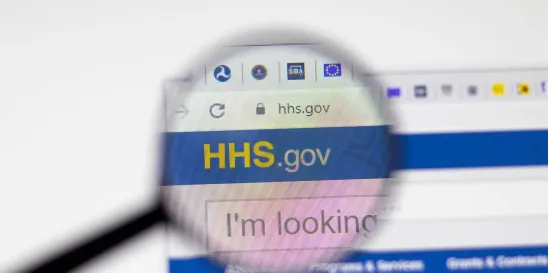Highlights
HHS-OIG released a favorable opinion on a medical device manufacturer’s cost-sharing plan for billable items and services provided to federal healthcare program beneficiaries participating in a clinical trial
The agency noted that the cost-sharing appears to be a reasonable means to facilitate enrollment of socioeconomically diverse participants in the clinical trial
The agency determined overutilization and inappropriate utilization was unlikely since the trial was limited, reasonably structured with appropriate safeguards, and distinguishable from problematic seeding arrangements
The U.S. Department of Health and Human Services’ Office of Inspector General (HHS-OIG) released Advisory Opinion No. 23-11, a favorable opinion regarding a proposed arrangement by which a medical device manufacturer would pay cost-sharing obligations that Medicare beneficiaries participating in a clinical trial would otherwise owe for study-related Medicare-reimbursable items and services, up to a maximum of $2,000 per participant. Despite implicating both the federal Anti-Kickback Statute (AKS) and the beneficiary inducement civil monetary penalty (CMP) rules, the agency on Dec. 27, 2023, determined it would not impose sanctions.
Background: Overview of the Study
The medical device in question is a device-based therapy designed to modulate the strength of cardiac muscle contraction in patients experiencing heart failure. It consists of a rechargeable implantable pulse generator, a charger device, a programmer, and implantable therapy-delivery leads manufactured by a third party. The medical device is currently approved by the U.S. Food & Drug Administration (FDA) for use in heart failure patients who meet certain criteria, including a left ventricular ejection fraction ranging from 25 percent to 45 percent.
The manufacturer is the sponsor of a clinical trial designed to determine the safety and efficacy of the medical device in a different population: heart failure patients with a higher ejection fraction of between 40 percent and 60 percent.
The manufacturer intends to enroll up to 1,500 individuals in the study, with participants randomized in a 2:1 ratio into a treatment group and a control group. To be eligible to participate, everyone, including federal healthcare program beneficiaries, must satisfy the enrollment criteria set forth in the study protocol and execute an informed consent document. All participants will receive the device’s pulse generator and associated leads. Specifically, for all participants, a physician will implant the medical device via a surgical procedure in an operating room or cardiac catheterization lab. For individuals in the treatment group, the device will be activated immediately. For individuals in the control group, the device will be inactive for the initial 18-month study period. Eighteen months after the implantation procedure, the unblinded trial phase will begin, and the device will be activated for participants in the control group.
The manufacturer will conduct the study at up to 150 sites in the United States and up to 75 sites abroad. The manufacturer will enter into written agreements with each site and each investigator, setting forth the parties’ respective responsibilities and compensation terms. The manufacturer certified that the compensation paid to sites and investigators will be fair market value for necessary study-related services. Investigators and sites must comply with requirements set forth in the study protocol.
The manufacturer would also pay cost-sharing obligations (i.e., copays) that Medicare beneficiaries participating in the study otherwise would owe for study-related Medicare-reimbursable items and services provided, up to a maximum of $2,000 per participant. The manufacturer would pay the cost-sharing amounts directly to the site and investigator to which the participant otherwise would owe the amount. As a result of these subsidies, Medicare beneficiaries would incur no cost-sharing expenses relating to their participation, unless their out-of-pocket cost-sharing obligations relating to the study exceed $2,000. According to the manufacturer, the purpose of the cost-sharing is to: 1) reduce financial barriers to enrollment and prevent attrition from the study due to financial reasons, 2) facilitate socioeconomic diversity of the study population, and 3) preserve blinding of participants.
HHS-OIG’s Analysis of the Cost-Sharing
The HHS-OIG determined that because the manufacturer would offer and pay cost-sharing amounts for billable items and services provided to Medicare and potentially other federal healthcare program beneficiaries participating in the study, AKS would be implicated because these subsidies could induce federal healthcare program beneficiaries to participate in the study, during which they would receive healthcare items and services that are reimbursable by a federal healthcare program. This would also implicate the CMP because the remuneration would be likely to influence a beneficiary to receive Medicare-billable items and services from a particular provider, practitioner, or supplier.
In addition, the manufacturer would provide remuneration to the investigators and sites participating in the study in two forms: 1) the opportunity to bill federal healthcare programs for items and services related to the study and 2) a guaranteed payment of beneficiary cost sharing (at least up to the $2,000 limit), which, in some circumstances, an investigator or site may not be able to collect in full. Both forms of remuneration to investigators and sites would implicate the AKS.
Nevertheless, the HHS-OIG determined the risk of fraud and abuse presented by the manufacturer’s study is sufficiently low under the AKS, which led to the favorable advisory opinion and no CMP sanctions. It noted three key reasons:
First, the agency said it appears to be a reasonable means of promoting enrollment in the study, particularly where patients participating in the control group would not have the potential to receive any therapeutic benefit during the study’s first 18 months. In addition, the cost-sharing subsidies that would be offered appear to be a reasonable means to facilitate enrollment of a socioeconomically diverse set of participants by removing a potential financial barrier to participation.
Second, the study would pose a low risk of overutilization or inappropriate utilization of items and services payable by a federal healthcare program because the study established guardrails to mitigate risk. In particular, the manufacturer certified it would not advertise the availability of cost-sharing subsidies. In addition, individuals must satisfy the enrollment criteria set forth in the study protocol and execute an informed consent document to be eligible to participate. Further, investigators and sites must comply with the study protocol and are subject to oversight and monitoring by an institutional review board. Study enrollment is also capped at 1,500 participants.
Third, the study is distinguishable from problematic seeding arrangements, such as those in which manufacturers initially offer subsidies to lock in future utilization of a reimbursable item or service. Here, the manufacturer would provide cost-sharing subsidies relating only to items and services furnished as part of the study. The medical device itself is intended as a one-time treatment and would not prompt future utilization by study participants of any other products manufactured or under development by the manufacturer.
Key Takeaways
The HHS-OIG continues to show leniency toward arrangements that do not improperly lead to federal healthcare program overutilization or increased costs. The agency emphasized that the manufacturer’s clinical trial was reasonably structured, had appropriate safeguards, and was distinguishable from problematic seeding arrangements.




 />i
/>i

